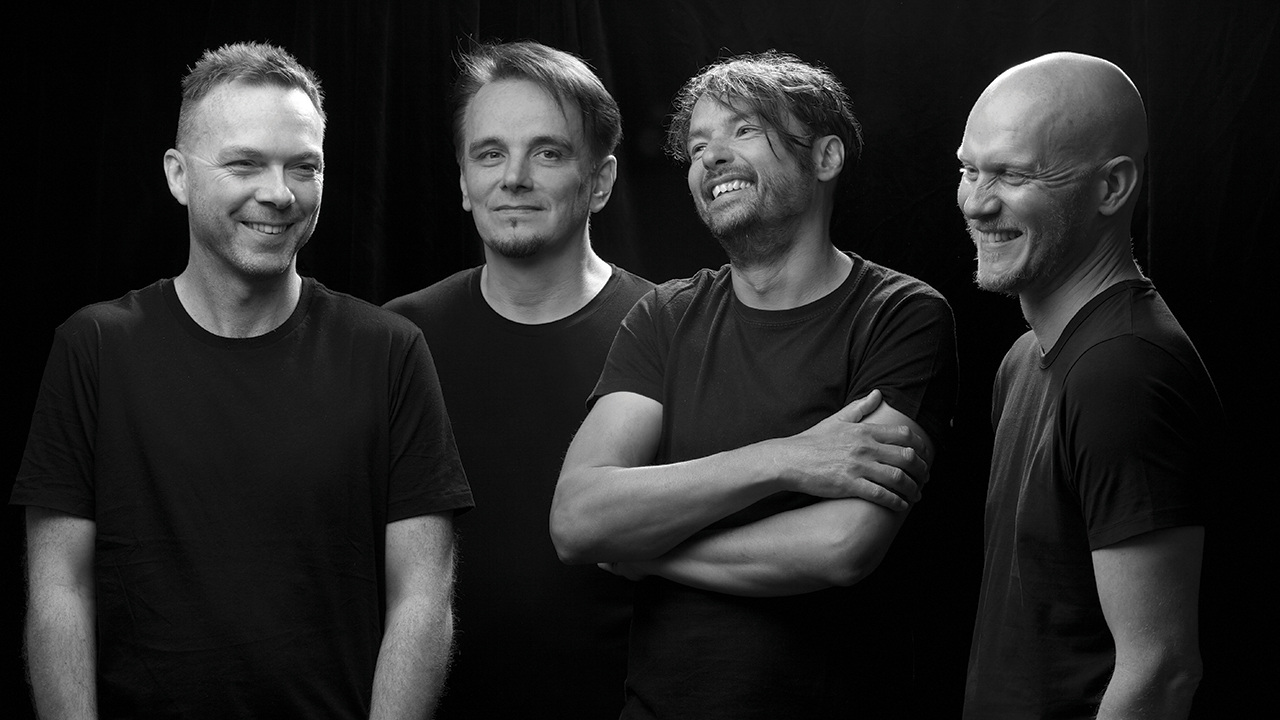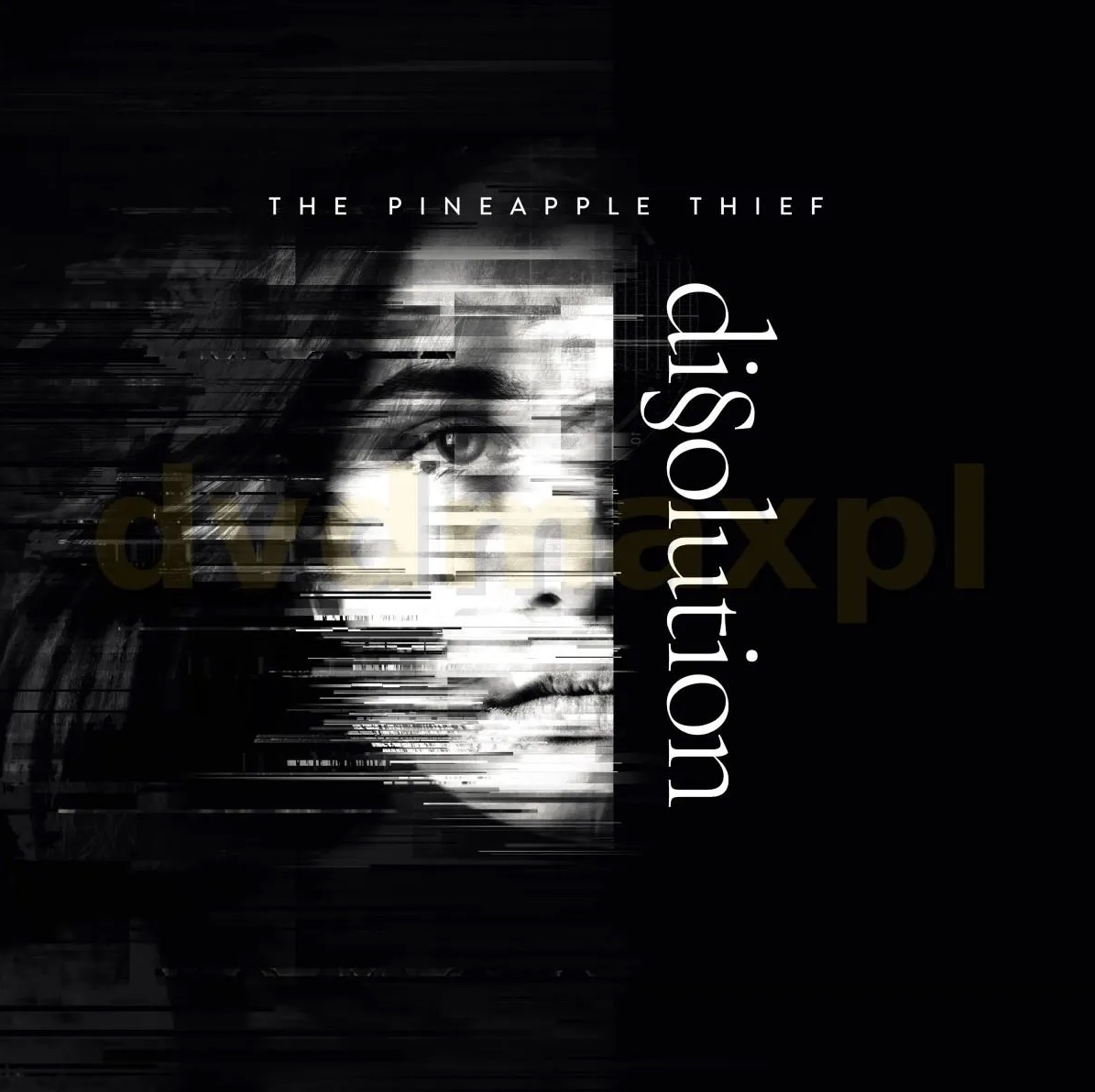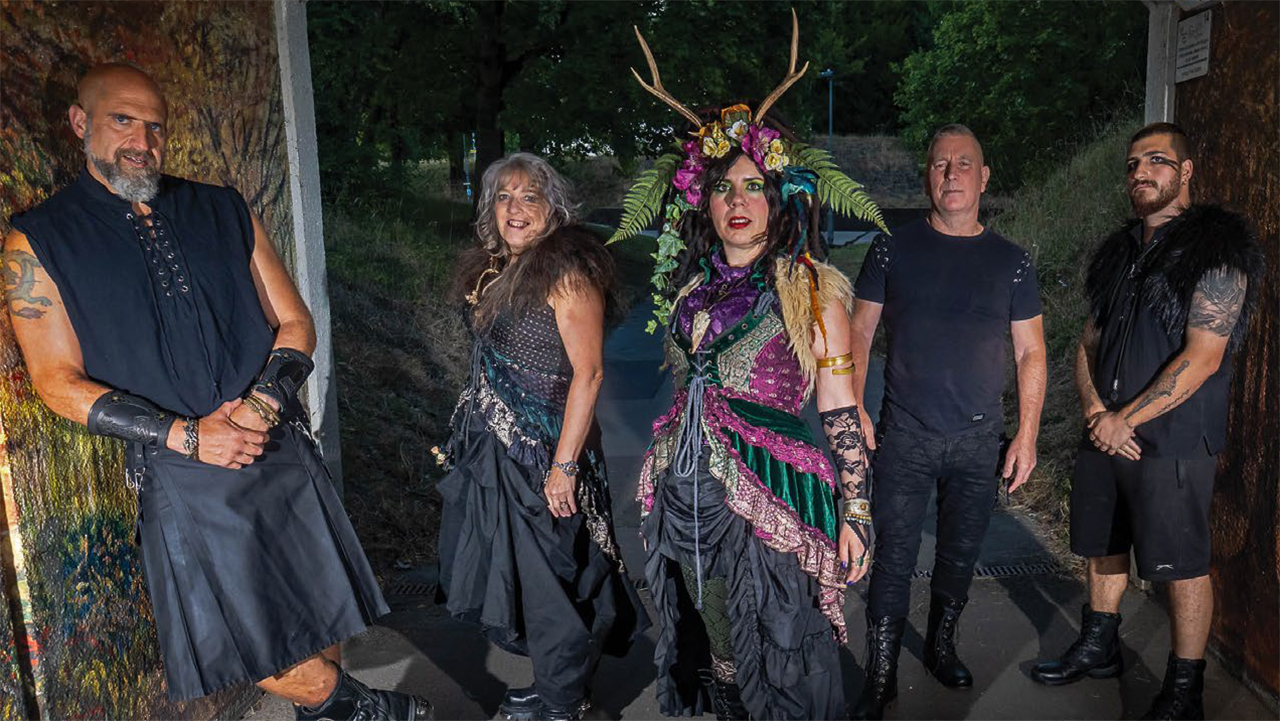“The way he uses all his drum kit; no one else really sounds like that." How Gavin Harrison's arrival inspired The Pineapple Thief's Dissolution
The Pineapple Thief are back with album number 12, one that perfectly encapsulates their style. Bruce Soord and Gavin Harrison talk dark lyrics, ‘cyber jamming’ and battling demons…

In 2018 Gavin Harrison officially joined The Pineapple Thief for album number 12, Dissolution. Prog chatted with him and mainman Bruce Soord and Gavin Harrison about how the band had changed, very much for the btter...
If your first impression of Bruce Soord was his lyrics, you’d expect a deeply troubled man. For nearly 20 years he’s specialised in beautiful angst, painting soul-searching vignettes that tap into some of the darkest recesses of human strife. At times this has been informed by personal experience, as seen in the introverted aggro of his earliest works, as well as the pain of losing a child in 2006’s Little Man.
To actually meet him, however, is to meet a different person: an upbeat leading light in alternative music (both as a musician and multi-channel mixer with Opeth, Anathema and Gong among his credits) and the happily married father of twins. A pretty happy guy, essentially.
“I still love every day, I savour every moment!” he beams from his Yeovil studio, in cheerfully accentless tones. “But I think it was when the label emailed me and said, ‘We need the lyrics,’ and I had them on pieces of paper, and I read over them and was like, ‘Oh my God, this is pretty bleak even for me.’”
So… are you okay?
“Yeah people do ask me that a lot,” he grins, slightly guiltily. “‘How’s your family? How’s your wife?’ We’re fine, we’re fine! But I guess it’s just looking at the world around me. I haven’t turned into this nihilistic kind of ‘we’re doomed’ guy. I don’t think that. I still think humanity is wonderful.”
Soord is in a good mood. Looking relaxed and magnificently tanned, he’s just opened his preferred end-of-day poison, a bottle of Duvel beer, and is ready to talk about Dissolution, his 12th album with The Pineapple Thief. It’s gone down very well, combining the hooky, contemporary-sounding tune focus of 2014’s ‘poppier’ Magnolia with the gnarlier, more sprawling impact of his classic prog and rock influences. With tunes ranging from sharp four-minute hits to the 11-plus minutes of White Mist, it’s perhaps the most complete representation of all the band’s epochs, from the atmospheric, twisty prog of 1999 debut Abducting The Unicorn through to the present.
Sign up below to get the latest from Prog, plus exclusive special offers, direct to your inbox!

And Soord appears no worse off for the remote, internet-based process that led to its creation. Not that the irony of making an album about the destructive effects of social media and 24/7 communication – via WhatsApp, Skype and the like – is lost on him.
“It’s a bit of a contradiction isn’t it!” he laughs. “Personally I took a step back and unplugged my connections and replugged them in just for the people who mattered.”
Still, in the wake of recent headlines – when we speak, Facebook overlord Mark Zuckerberg has recently lost almost $17bn in an hour – the album’s thematic focus feels pleasingly topical.
“I think in centuries to come, the period we’re going through now will be recognised as a momentous time, not in a good way,” he says. “I think people are realising that it’s gone too far.”
Family and friends aside (his wife is expecting their third child in October), the people he’s cared about staying connected with are the other musicians that complete The Pineapple Thief. There’s bassist Jon Sykes, who Soord has known since he was 18, long‑time keyboardist Steve Kitch, collaborating guitarist Darran Charles (also of heavy progressive types Godsticks) and drummer Gavin Harrison.
It’s difficult to be immersed in the progosphere without coming across Harrison. The goatee-ed sticksman from Middlesex has become one of the most in-demand drummers on the scene. Following years of work as a sideman to various megastars, he gradually moved into a new niche: giving established progressive acts a new lease of life. First it was Porcupine Tree (his arrival, for 2002’s In Absentia, saw them effectively ‘break out’), then King Crimson – with whom he’s on tour when we talk over the phone for this piece – and most recently The Pineapple Thief.
Following an introduction via their mutual label Kscope, Harrison was effectively ‘parachuted’ in to help finish arrangements for 2016 album Your Wilderness. This time, now an official member of the band, he was involved with songwriting from the beginning, laying down drum parts from his own Tardis-like studio in London. Even ‘cyber jamming’ ideas, as they did, it still felt like an organic team effort, compared with earlier records for which Bruce would demo up tracks very thoroughly before showing them to the rest of the band.
“We batted it back and forth like that, and that was the big difference,” Soord reasons. “People automatically think, ‘Oh my God that’s such a sterile environment, creating this album with some kind of formula,’ but it wasn’t like that at all. It was like being in a sweaty rehearsal room, but 200 miles apart!”
For Harrison this arrangement felt completely natural. It’s how all the Porcupine Tree records he was part of were made, and how he does most of his recording these days.
“Even with The Pineapple Thief we could’ve afforded to go in a studio and do it all together,” he says. “But you do get used to the idea of having no pressure, so if you want to spend three days working on a drum track, that’s fine. You haven’t wasted anyone’s time, you haven’t wasted anyone’s money. It’s a different story when all of the band members are sitting in an expensive studio in London and racking up thousands a day – there’s much more pressure.”

If Soord is the warm, chattering face of The Pineapple Thief – flitting between artistic confidence and decidedly British self-deprecation – Harrison is something of a straight-faced counterpart. As an interviewee, he’s not unlike Steven Wilson. Serious but willingly talkative, he speaks clearly in full sentences, and with his uncompromising dedication to music, you can see how the pair got on well in Porcupine Tree.
“There has to be an amount of privacy, I suppose, to a certain degree,” he says thoughtfully of the recording process. “It’s a bit like taking all your clothes off in public: you’re revealing a quite intimate part of yourself when you’re recording and trying to express yourself in a very meaningful way. You’ve got to strip off all your excess things.
“You’ve got to get to a place that you might not feel comfortable with,” he continues. “You’re going to make an idiot out of yourself sometimes and you don’t want everyone standing around while you’re doing it. I don’t feel that way personally on the drums, because I’ve come from a time where I used to do lots of sessions in studios with quite an audience. The very first Porcupine Tree album I did was like that actually; all the band, all the record company, and the engineers, and the management were all in the control room.”
A naturally “coordinated kid”, Harrison went to ballet school as a six-year-old (before discovering the drums) and watched his jazz trumpeter father play sessions at the BBC. Since then he’s strived to produce unique drum parts, whether it’s for a complex pattern or a standard 4/4 tempo, as shown on the dextrous yet restrained fills and rhythms on Dissolution. It lends itself well to the mix of oddball edges, melodic euphoria and biting progressive moodiness in highlights like Try As I Might and Threatening War.
“Before, in The Pineapple Thief, it [the drums] was there to serve a purpose,” says Soord, “it wasn’t really there to be creative. It was more about holding down a beat. I think Gavin’s approach to drumming is so much more considered and so musical.
“The way he uses all his drum kit, his toms and these tiny cut-down cymbals, no one else really sounds like that,” Soord continues. “It just inspires you to do stuff… and our bass player Jon, as soon as he heard it, all of a sudden he sounded like a better bass player. It made me realise actually how good Jon is because he was there playing and interacting with all these really delicate elements that Gavin brought in.”
A multi-instrumentalist, as well as a drummer, he also plays a vintage wurlitzer on the middle section of one track, Far Below. Not that Harrison seeks to overwhelm with virtuosity, he says.
“I always think an artist should hide their technique, it shouldn’t be on display,” Harrison reasons. “It’s like your underwear, I don’t want to see what underwear you’re wearing. I hope you’ve got some on, but that’s not the artistic point. It about what you’re saying. Obviously you’re using technique to express your point, but it's not the main thing.”
When he joined, Soord said that Harrison (together with guitarist Charles) gave the band “a new lease of life”. Did they seem like they were a band in need of a gear change, or help?
“I’d heard a couple of songs on a podcast and thought they were good,” Harrison says. “When Bruce contacted me I was very open to the idea and happy to do it. But I wasn’t making a deliberate effort to change the sound of that band; that’s how they reacted to my sound. So it became a new-sounding group.”
While Harrison’s CV can be heard in Dissolution (the Porcupine Tree side especially), the full album embraces wider progressive terrain. The aforementioned White Mist in particular indicates a return to Soord’s proggiest roots. As a child he lapped up records by Pink Floyd, Supertramp and the Alan Parsons Project, the influence of which has transferred to his present-day appreciation of more psychedelic jams. There were certain cornerstones of classic prog that didn’t sit so easily, though…
“I remember when my mates were listening to Yes and they lent me Close To The Edge, and I thought, ‘Oh God, what is this?!’ I hated it,” Soord remembers. “And after the fifth time, I was like, ‘Alright, it sounds okay now, I’ll keep playing it,’ and I must’ve had to keep playing 20 times till I could understand it and get into it. So even though I love that period of Yes now, at the time I found it really quite impenetrable. I was always more into the more melodic side of stuff, which is obviously why people like Floyd and Supertramp were up there.”
In the late 80s and 90s he turned to the grungy likes of Nirvana, before swerving through the Red Hot Chili Peppers, Living Colour, Radiohead, early Biffy Clyro in the 00s and many others. Picking up tones and tricks along the way, it’s made for a “weird mix”, but one that’s resonated with scores of fans. Not that there hasn’t been some resistance along the way.
“If someone [on social media] wants to take a shot at you, you have to take it,” he says, harking back to the lyrical themes of Dissolution. “You’ve got to have a really thick skin. And in the mid-period of The Pineapple Thief I didn’t have a particularly thick skin. I used to get really upset and couldn’t sleep ’cos I’d be thinking about these things that people were saying. It doesn’t bother me now… okay, maybe a tiny, tiny bit, but in my old age I think I’ve conquered that.”
For all the home studio perfectionism of Dissolution, the live show promises to be a lively affair: “No shoegazing!” Soord chuckles. “And I’ll be sticking my guitar in the air and running around…”
As a unit they seem more confidently placed for touring compared with earlier tours – during which Soord, crippled by stage fright, would get drunk every night to get through it all. He concedes he’s since had to “clean up” his act.
Have you overcome those demons now?
“I have put those demons to rest,” he nods. “It took a long time. I think a lot of it is to do with having a band that is so good and to know that I can step onstage and it’s gonna be great. Whereas in the old days I’d be so terrified of the whole process. But now that we’ve got to where we are…”
He pauses and smiles, slightly disbelieving: “It’s only when you ask me questions like this that I think about how far we’ve come, especially over the last four years, that I realise that I have overcome my stage fright. Which is good. I’m pleased!”

Polly is deputy editor at Classic Rock magazine, where she writes and commissions regular pieces and longer reads (including new band coverage), and has interviewed rock's biggest and newest names. She also contributes to Louder, Prog and Metal Hammer and talks about songs on the 20 Minute Club podcast. Elsewhere she's had work published in The Musician, delicious. magazine and others, and written biographies for various album campaigns. In a previous life as a women's magazine junior she interviewed Tracey Emin and Lily James – and wangled Rival Sons into the arts pages. In her spare time she writes fiction and cooks.
